#ben macintyre
Text




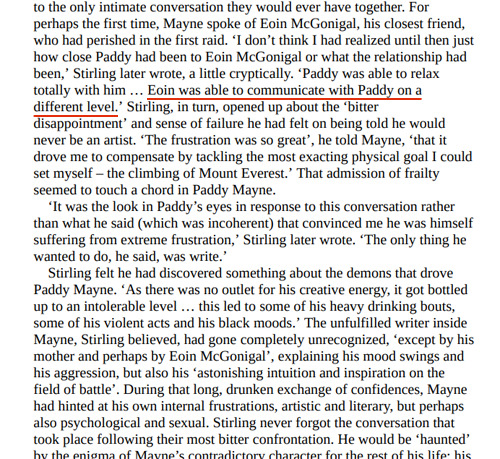


Ben Macintyre on Paddy Mayne's sexuality and Eoin McGonigal
130 notes
·
View notes
Text

This is a book for readers of second world war history who like the Boy’s Own version of the conflict. The cast of characters could have stepped straight from a comic strip story. Yet the men of the SAS were real flesh and blood, “rogue heroes” as the title suggests. The organisation now famous for its derring-do, and as famously secretive, has opened its archive to the historian and journalist Ben Macintyre, so that he can produce the first authorised history of what the SAS did in the war.
Macintyre has made the most of the opportunity. The history needs scarcely any embellishment, though he tells it with flair: the simple facts of SAS activity make the “ripping yarns” of comic book heroes pale by comparison. The organisation was the brainchild of two officers posted to the war in Egypt, David Stirling and John “Jock” Lewes. Stirling was an awkward soldier, hostile to spit-and-polish and authority, charming, fun-loving and irreverent (“layer upon layer of fossilised shit” was how he described military bureaucracy). Bored by life in Cairo, he discussed with the ascetic, hard-working, serious-minded Lewes, his complete opposite in personality, the possibility of creating a unit of awkward men like himself, who wanted action, few rules and adventure in small hit-and-run assaults behind enemy lines. Astonishingly, Stirling persuaded the high command in Cairo that he could achieve something significant at low cost in men and materials. The chief of British deception in the desert war, Dudley Clarke, gave the unit its name. Already fooling the Italians with a bogus parachute unit, the First Special Air Service Brigade, he lent the name to Stirling, and the organisation has borne it ever since.
Macintyre uses the SAS war diary as the backbone of his narrative, and is candid about failure as well as the hard-earned successes. The SAS was an irregular unit, its members drawn from an extraordinary range of backgrounds – a spectacles salesman, a textile merchant, a tomato farmer, amateur boxer, and so on – with a range of motives to match. Some wanted excitement, some liked killing and made no pretence about it, some were escaping from their past, some were too eccentric for the ranks; all had to be fit, alert, crafty, ruthless if required and dedicated to the mission. Stirling was also aware that his outfit did not meet with approval in conventional military circles, which saw war as face-to-face, not behind the back. Churchill liked the force, and would no doubt have joined it had it existed in his youth. But through the campaign in North Africa, then Italy and Germany, the SAS had always to prove itself, in order to stave off disbandment.
The new unit nevertheless made a disastrous start and indeed had mixed fortunes throughout the war. The first operation, code-named “Squatter”, carried out while the handful of volunteers were still feeling their way, could not have gone more wrong. Poorly trained as paratroopers, the group nevertheless flew off into a desert storm trying to land at pre-planned dropping zones well to the rear of the enemy. They landed in the worst places, faced a Saharan downpour of biblical proportions, lost some of the troop to injury as they hit the ground, and were then unable to retrieve the parachuted supplies. With explosives so soaked they were worthless, uncertain about their whereabouts, short of food and water, the remnants of the original units made their way back to Egypt. Out of 55 men, 34 were killed, injured, captured or missing without a single achievement.
Macintyre makes the point that this was by no means the end of a madcap idea. Stirling recruited the Long Range Desert Group to take the SAS teams by Jeep or truck rather than risk any further parachute drops, and the second set of raids in December 1941 resulted in the destruction or disabling of 60 enemy aircraft. But Operation Bigamy, a series of raids against Benghazi shortly before the battle of El Alamein, was another disaster. It featured one of the most bizarre figures to emerge from the story: a Belgian textile merchant, Robert Melot. Fluent in Arabic, keen to get at the Germans, he volunteered for the SAS aged 47 as an intelligence officer. He used his range of Libyan contacts to glean information needed for the raids, but in this case Melot miscalculated. An Arab double agent alerted the Germans and Italians and the raids were a disaster. Once again a forlorn, bearded, hungry and damaged band straggled back to Cairo. Melot carried on his SAS career regardless, and died not from his many scrapes in battle, but from a Jeep accident on his way to a party in Brussels late in 1944.
The SAS came of age in the campaign in Italy, where it was used as a more conventional raiding party, the Special Raiding Service, under the command of Paddy Mayne following Stirling’s capture in Tunisia in late 1942. The Italian campaign was a particularly grisly one, and the SRS (with its core of SAS men) found collaboration with the partisans and rivalry with the Special Operations Executive (SOE) a challenge (unlike the SAS, the SOE always linked up with local resistance). Macintyre spares none of the details; the SAS fought a dirty war against an enemy they regarded as every bit as dirty. Prisoners were rare, but in return Hitler condemned irregular commando units to death if they were caught. Not all were killed by any means, but many were, just as the Germans killed all the other irregular, partisan forces ranged against them.
In October 1945 the army wound up the SAS and it continued to exist by subterfuge, a unit of war crimes investigators searching for evidence across Europe that SAS members had been murdered. In 1947, to meet the many crises of empire, the SAS was revived. What it did then and since can be guessed at, but until the postwar unit diaries are revealed, like the wartime diary used by Macintyre, the exact details will not be known.
What in the end did the SAS achieve in the war? Macintyre does not really say, leaving the narrative to speak for itself. It did not, as some of the book’s publicity has suggested, turn the tide of war. Its overall accomplishment, set beside those of the Commandos, or the SOE, the Chindits or other partisan groups, was strategically modest, whatever its tactical successes. But the SAS did bring to life the plucky, maverick, individualist hero of the comic strip, a very British way of making war. SAS: Rogue Heroes is a great read of wartime adventuring, in a long, grim war of attrition where adventure was hard to find.
Daily inspiration. Discover more photos at Just for Books…?
26 notes
·
View notes
Quote
[Michael John Bettaney] lived alone, with a large plastic figurine of the Madonna, a number of Russian icons, a drawer of Nazi war medals and an extensive collection of pornography. Withdrawn and isolated, he repeatedly tried to persuade the female staff at MI5 to sleep with him, without success. He was occasionally overheard at parties drunkenly shouting: 'I'm working for the wrong side' and 'Come and see me in my dacha when I retire'. Six months before the first delivery to Guk, Bettaney had been found sitting on a pavement in London's West End, too inebriated to stand. When taken into custody for being drunk in a public place, he shouted at police: 'You can't arrest me, I'm a spy.' He was fined £10. MI5 did not accept his offer of resignation. This was an error.
Ben Macintyre, The Spy and the Traitor
#quote#quotation#Ben Macintyre#The Spy and the Traitor#Michael John Bettaney#he tried to sell secrets to the KGB#the London head of the KGB thought he was a plant and ignored his letters#spy#spying#espionage#MI5#in retrospect maybe Spooks underplayed staffing issues
29 notes
·
View notes
Text

Ok I'm gonna go cry in a corner now
10 notes
·
View notes
Text
Something wonderful that nobody tells you about being an adult is that occasionally you get to go to bed at 7pm on a Friday with a large mug of tea and four books.
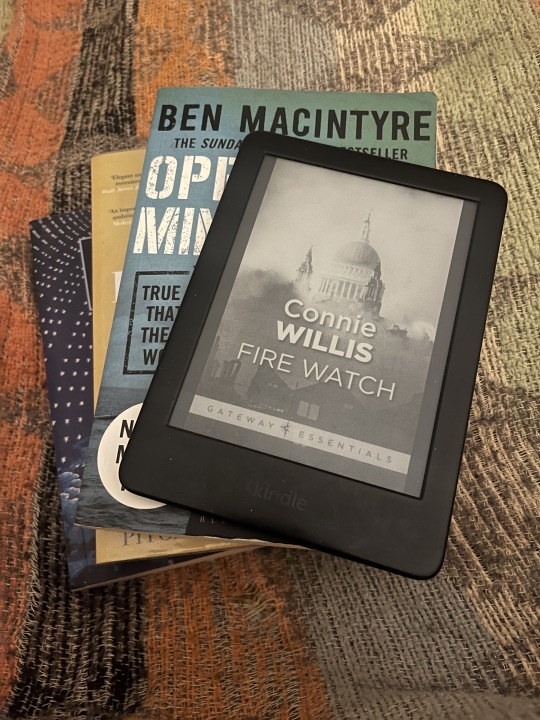
#and it feels so good!#it’s been SUCH a weird week at work#it’s been WEIRD and I am TIRED and I woke up at 0245 this morning and couldn’t get back to sleep#so I have earned this early night I think#Lou reads#Lou talks#tea!#books!#connie willis#ben macintyre#pitchaya sudbanthad#martin edwards#the tea is decaf
2 notes
·
View notes
Text
My Reading in 2022
My Reading in 2022
I’m now well into the habit of updating my reading progress on Goodreads because as I read virtually everything on my Kindle, it does it automatically. In December 2022 Goodreads told me that I had read only 21 books which is quite a lot fewer than in 2021. I thought a couple of books took a long time to get through as they seemed much longer but on a Kindle you don’t get as much of a feel for…
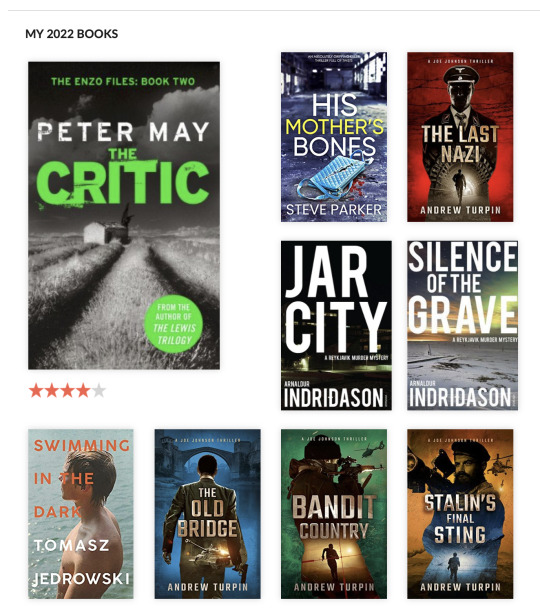
View On WordPress
#Alex Gerlis#Andrew Turpin#Arnaldur Indriõason#authors#Ben Macintyre#books#Cold War#David Gibson#espionage#fiction#Goodreads#Karin Slaughter#Kindle#Mick Herron#murder mysteries#non-fiction#series#Steve Parker#Tomasz Jedrowski#WW2
7 notes
·
View notes
Text
85. Colditz: Prisoners of the Castle, by Ben MacIntyre
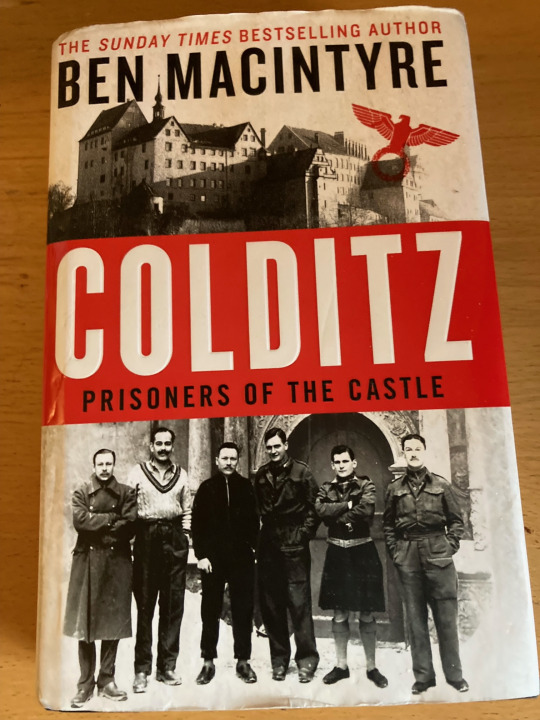
Owned: Yes
Page count: 327
My summary: During the Second World War, the imposing German castle of Colditz was used to house the most notorious Allied prisoners of war - the escapers, the troublemakers, the ones who proved difficult to contain. This is their story, from the first POWs to walk through the gates, to the liberation of the castle.
My rating: 4/5
My commentary:
Look, at this point, I don't feel the need to justify myself anymore. I've got a few special interests in things that most people aren't interested in, and one of those special interests is prisoner of war camps during World War Two. And, specifically, Colditz. It's an interesting subject, okay! I'm always fascinated by the ways that people react to being put into extreme situations, as well as the nuances of class in the 1940s and the ways we retell these stories. This was an interesting read, but first - Jamie gets on their soapbox!
So many POW tales that get retold (see the Great Escape) are of Plucky Brits Plus A Token American Or Two exhibiting the classic Stiff Upper Lip and treating wartime escapes like they're games. Which wasn't the reality for most POWs, and not even most officers. See, under the Geneva Convention, officer POWs could not be made to work in captivity, whereas regular soldiers could. In the earlier stages of the war, the penalty for attempting escape as an officer would be returning to the POW camp and some time in solitary. Regular soldiers could be shot. And so many of our POW narratives revolve around the Heroic Escaper that Kept Defying The Nazis even after captivity...which subtly reinforces the idea that some, who saw less combat, aren't worth talking about. There's class dynamics, there's toxic masculinity, there's a lot going on in how we characterise people in this time period, and a lot of nuance gets lost in media like the Great Escape, which mostly focuses on Posh Lads Escaping And Fighting The Good Fight, rather than the regular lives of men who were captured by Germany.
Anyway. This book specifically! It promises to be the true story of Colditz, but it still mostly focuses on some of the same old stories - understandable, Colditz was the camp where they housed the chronic escapers and much of the camp genuinely was trying to escape in their time. That said, despite the fact that I already knew some of the stories relayed in this book, I wasn't ever bored. It builds up its core cast of characters quite nicely, from the German commander of the camp to the British prisoners (and some from other nationalities) living there. It is quick to criticise people who need criticising, including war hero and notable asshole Douglas Bader, and shows a level of nuance when talking about the German officials, most notably the difference between the regular German army and the Gestapo, the latter of whom were far more likely to torture and murder prisoners. Overall, if you're interested in the subject, it's a pretty good book! I'm probably gonna return to it a few times when in the throes of Special Interest Fever, that's for sure.
Next up, it's graphic novel time, and we're off to Oregon to the sleepy town of Gravity Falls.
4 notes
·
View notes
Photo

A SPY AMONG FRIENDS premieres on MGM+ tonight at 10pm
#a spy among friends#damian lewis#guy pearce#series premiere#mgm+#book adaptation#tv show poster#spring tv#premiere#sunday tv#on tv tonight#ben macintyre
0 notes
Text
‘‘A ‘Potemkin village’ has come to mean any construction, literal or figurative, that gives a fake impression of permanence and prosperity. The term derives from exaggerated stories that Potemkin built phoney portable villages along the banks of the Dnipro when Catherine the Great was visiting that could be taken down after she had passed and reassembled further along the royal route. Kherson itself was not a Potemkin village but a strategic shipbuilding port built by the prince at enormous cost in lives and treasure. Potemkin planned the city as a second Amsterdam. The name comes from the ancient Greek city-colony of Chersonesus in Crimea, the region known to the Greeks and Romans as Taurica. Writing to the empress, Potemkin went into raptures about his project: ‘Russia needs a paradise: Tauric Kherson!’ ’’
- Ben Macintyre
1 note
·
View note
Photo
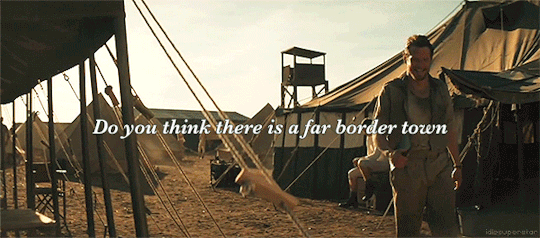

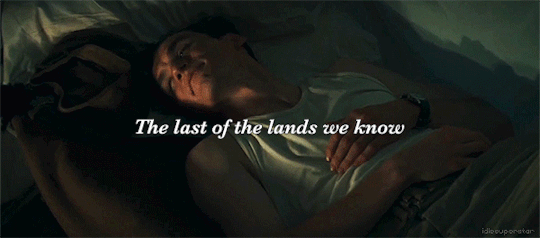

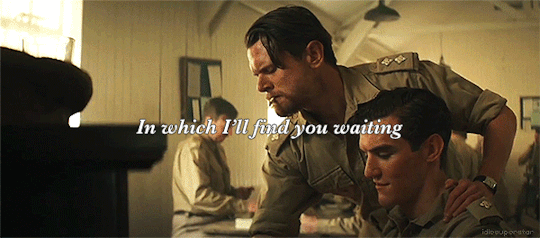
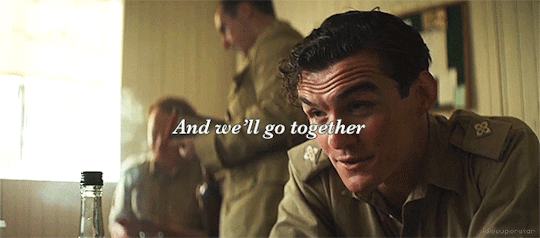
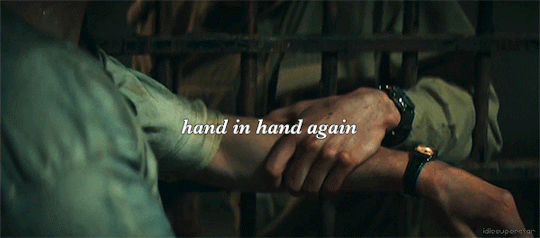

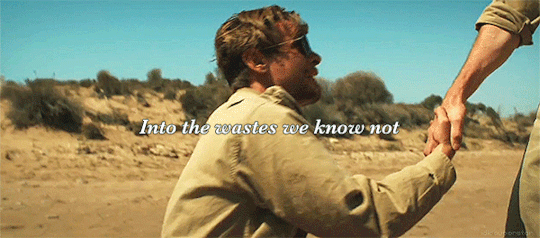
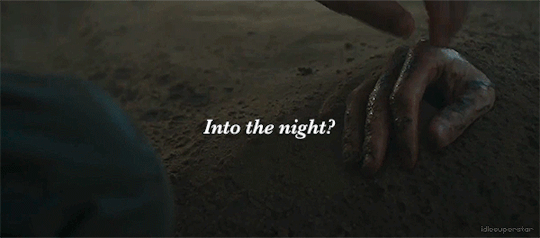
- He’s the same man I knew before in Ireland, but lately...I’m...changed...by him.
#jack o'connell#dónal finn#sas rogue heroes#jesus fucking christ I was not prepared for this#I don't need another doomed poetic gay ww2 ship thanks everso#you know how much this got me#I"ve not even finished the series I just had to gif these two#because AUGH#I love paddy way more than I should considering he's such a mentaller#cue me googling jack o'connell to see if it's creepy for me to fancy him#and he was born in 1990 so yeah it is a bit sigh#anyway this is fucking tremendous and I didn't know alfie allen could act so well#and obvs anything ben macintyre is good for me#and they've done a fucking amazing job#and all the ac/dc really works I don't care what anyone says#I just need to have a moment with sad poetic paddy at eion's grave ok#my wee gifs
93 notes
·
View notes
Text
Miles: I like personality quizzes in theory but in practice I just get irritated by the semantic ambiguity of literally every question. "On a spectrum from scientific to artistic what are you" motherfucker I literally wax poetic about the laws of thermodynamics where the fuck does that land on your spectrum.
-----------------------------------------------------------------------------------------------------------
Ben Riley: due to personal reasons I will be sitting on my bed in a wet towel and staring at the wall for the next 25 minutes.
----------------------------------------------------------------------------------------------------------
Jess: Your future self is hating you for the poor decisions you're making today.
Gwen: Bold of you to assume current me isn’t also hating myself for making the decisions that I am making.
----------------------------------------------------------------------------------------------------------
Bonnie: Beat your depression. Beat it with a fucking broom, beat it into the fucking ground, die, die, die!
-----------------------------------------------------------------------------------------------------------
Hobie: Nobody controls what I do!!! Nobody! Not even me! I'm out of control but only I control that!
----------------------------------------------------------------------------------------------------------
Pavitr: *watching Margo play a video game* In a game, with no consequences, why are you still playing the 'good' side?
Margo: Because being mean makes me feel bad.
-----------------------------------------------------------------------------------------------------------
Ganke: I hate how you're just born out of nowhere and you're forced to go to school and get education so you can get a job what if I wanted to be a duck?
----------------------------------------------------------------------------------------------------------
Miles: I hate when people are actually really prepared for a test. Like, who do you think you are? Someone who actually has their life together? That is not acceptable
----------------------------------------------------------------------------------------------------------
Bonnie: Earthquakes are the weirdest things. Like we're just floating in space and our planet just decides to spontaneously do the chimichanga.
Miguel: Who let her back in?!
-----------------------------------------------------------------------------------------------------------
Spectacular! Peter: Just found out my entire personality is a trauma response.
----------------------------------------------------------------------------------------------------------
Miguel: Peter B. is trying to prove that he's closer to the younger spiders than I am but the joke is on him because he doesn't know how little I care for Gwen.
-----------------------------------------------------------------------------------------------------------
Jess: Orbweaver! What’re you doing today?
Bonnie: Having my day ruined with whatever you’re about to ask me to do.
-----------------------------------------------------------------------------------------------------------
Peni: do you care if i take the skin off of the furby? I want to make him a diety. once he is free of his sinful flesh he can begin the path towards enlightenment. he will take care of us. Also I want to softhack his circuits
Miles: i literally could not care less but never say anything as frightening as that ever again
---------------------------------------------------------------------------------------------------------
Hobie: Who hurt you?
Gwen: Do you want a list or what?
Hobie loading his gun: Actually, yes.
----------------------------------------------------------------------------------------------------------
Margo: I am shattering like glass, but at least I have video games
-----------------------------------------------------------------------------------------------------------
Spot: Hello there, Spiderman. Long time no see. Except in my revenge fantasies, where I see you on an hourly basis.
----------------------------------------------------------------------------------------------------------
Pavitr: Miguel sleeps after us and is awake before us. Does he ever actually sleep?
Spectacular! Peter: I think he periodically makes a whirring noise and then just shuts down.
-----------------------------------------------------------------------------------------------------------
Hobie: It's your first time being a fugitive, so I made you a watch.
Gwen: Thank you, Hobie.
---------------------------------------------------------------------------------------------------------
Ben Riley: I'm sorry I messed everything up. I guess I'm not cut out for the high stakes world of having friends.
--------------------------------------------------------------------------------------------------------
Miguel: It was reported to me by—
Miles: By your spies?
Miguel: No, no. Not spies. People I have terrorized into doing my bidding and watching other people and places for me. You pay spies.
---------------------------------------------------------------------------------------------------------
Pavitr: Remember how I have such good luck that it’s almost bullshit?
Gwen: I’m afraid to ask, but go on.
-----------------------------------------------------------------------------------------------------------
Miguel: Bonnie, a question — if Jess and I were drowning, who would you save?
Bonnie: You can both swim.
Miguel: True, but it’s a hypothetical question, so who would you save?
Bonnie: My time and effort.
----------------------------------------------------------------------------------------------------------
Margo: Remember Spiderwomen, before you say or do anything, ask yourself: Is this something that would get me diagnosed with female hysteria and locked in the attic by my relatives in the late 19th century? If the answer is yes, proceed.
----------------------------------------------------------------------------------------------------------
Ham: Hey! How’s it going?
Peni: On all levels except physical, I am dead.
--------------------------------------------------------------------------------------------------------
Miles: Top 30 reasons why Spiderman is sorry, number five will surprise you!
Spot: Top 30 anime deaths! Number one: Your fucking ass right now!
----------------------------------------------------------------------------------------------------------
Bonnie, taping a knife to a roomba and setting it loose: Be free, my child.
Miguel, entering the room with a cut on his ankle: WHO THE FUCK—
#into the spiderverse#Miles Morales#jessica drew#Spider Ham#peni parker#Hobie Brown#the spot#pavitr prabhakar#margo kess#peter b parker#ganke lee#peter parker: the spectacular spider man#ben riley#Gwen Stacy#miguel o'hara#itsv oc: Orbweaver#bonnie macintyre
125 notes
·
View notes
Text
the problem with trying to write ~historically accurate WWII fic is that everything that really happened in WWII was wilder and more batshit than anything I could come up with, even with superheroes and time travel included. especially in intelligence but also just in general.
#the more I learn about soviet intelligence in britain the more I'm like. hmm. why am I introducing more of it.#in-universe in the mcu there's definitely some best-selling award-winning ben macintyre book on the howling commandos and/or the ssr#adventures in accountability#iw time travel concept
53 notes
·
View notes
Quote
Paranoia is born of propaganda, ignorance, secrecy and fear. The KGB's London station in 1982 was one of the most profoundly paranoid places on earth, an organization imbued with a siege mentality largely based on fantasy. Since the KGB devoted enormous time and effort to spying on foreign diplomats in Moscow, it assumed MI5 and MI6 must be doing the same in London. In reality, although the Security Service certainly monitored and shadowed suspected KGB operatives, the surveillance was nothing like as intensive as the Russians imagined.
The KGB, however, was convinced that the entire Soviet embassy was the target of a gigantic and sustained eavesdropping campaign, and the fact that this snooping was invisible confirmed that the British must be very good at it.
Ben Macintyre, The Spy and the Traitor
#quote#quotation#Ben Macintyre#The Spy and the Traitor#KGB#paranoia#propaganda#ignorance#secrecy#fear#London station#fantasy#siege mentality#spying#espionage#Moscow#London#surveillance#Soviet embassy#snooping#invisible
15 notes
·
View notes
Text
listening to the operation mincemeat soundtrack and considering (once again) rereading the book
3 notes
·
View notes
Text

a totally unbiased (no) and mostly serious (i guess) spoiler-free primer
I've seen a bunch of posts floating around encouraging people into the fandom, or HBO War people looking for a new fandom/show to sink their teeth into. Here's my effot to add to the propaganda, because I've been in this fandom since Nov '22, it's delightful here and I always love a new SASRH friend to chat to.
tl;dr: it's a lot of fun
premise & setting
SAS: Rogue Heroes is the story of the founding of the original* Special Air Service (SAS) of the British Army during WW2. It centres three of the initial founders, David Stirling, Blair 'Paddy' Mayne and Jock Lewes. Two of other men credited as founding the SAS, Bill Fraser and Georges Bergé also feature. Bill Stirling, David's older brother and integral to the founding of the SAS, will feature in series 2.
Series 1 is 6 episodes long, covering events from the North African campaign from May '41 through Jan '43. Series 2 has been filmed and will move the action to Europe.
Based largely on the book, SAS: Rogue Heroes by Ben Macintyre.
*it was disbanded in Oct '45, and reformed in '47, ultimately leading, through various machinations, to the modern day SAS.
historical accuracy
Somewhat more fast and loose with history than Band of Brothers, The Pacific or Masters of the Air, but not bad enough to send historians spiralling into deep despair, with one very important caveat: the depiction of Paddy Mayne. More on him and this in a moment. However, it has generally been well received. Damien Lewis (the author and historian, not the actor) said "...it's reasonably realistic. It tells a great yarn. I think they've used some artistic license, I can understand why they've done so to a certain extent... Generally they've got the equipment and the kit bang on, I think they had some very good advisers." (here)
There are some weird timeline issues, which I think is caused largely by odd pacing and editing. I'd not worry about this too much, otherwise you'll break your brain. Likewise, liberties have been taken with the geography, which I think is a bit more heinous, but ymmv.
characters: lads lads lads lads lads
after the first four, these are in no order of importance, before anyone gets on at me about their favourite. i also appreciate there are other characters but this bit was already getting really long.
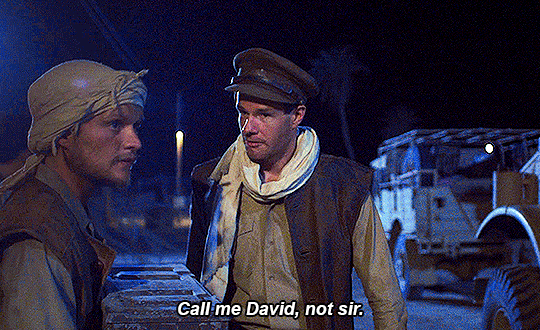
david stirling (connor swindells) - the dreamer
Arrogant, manipulative, clever, charismatic bastard. David Stirling is fueled chiefly by daddy issues and an inferiority complex a mile wide. Connor Swindells walks a beautiful line between swagger and vulnerability. He does not let things like "common sense", "safety precautions" or "understanding the implications" get in the way of doing important things like flinging himself out of a plane in the middle of the desert or talking his way into army bases armed with nothing but crutches and chutzpah.

blair 'paddy' mayne (jack o'connell) - the madman
Paddy Mayne my BELOVED. Character of all time. He's a drinker, a fighter and abhors a bully. For most of the show, we see him at his most desperate and most angry and arguably most violent. HOWEVER, he's also a highly intelligent, sensitive, compassionate poet and voracious reader; if there's a bunch of poetry being quoted, it's probably Paddy doing it. He loves so very deeply. His depiction in the show is a bit of a bone of contention with family and historians - some people read him as being depicted as a violent thug only, and that's not what the real Blair Mayne was like. Which is simultaneously true and not true. Blair Mayne was an incredibly complicated man.
The other contentious-to-some point is that the show does deliberately suggest his queerness, something Jack O'Connell has talked about in interviews. Some people have taken issue with this. Either way, for those who saw the sand wrestling gifs and wanted to know if SASRH was just queerbaiting, the answer is no, actually. But don't expect anything explicit on this front.
Jack O'Connell looks like he's having a fucking fantastic time.

jock lewes (alfie allen) - the creator
In real life, Jock Lewes was nicknamed "The Wizard", how great is that? David, Paddy and David met in training and are referred to in show as "the Three Musketeers". He is basically the mediator between Paddy and David, which sounds dull, except Jock is also batshit and clever and scary. He makes all the lads do intense marches in the desert without water, but is never willing to ask someone to do what he wouldn't do. Trouble is, as mentions, he is batshit so his standards are VERY VERY HIGH. He also has a fiancee, Mirren, whomst he loves very much and their relationship is so tender and brings me to tears on the regular.

eve mansour (sofia boutella)
Eve works for French Military Intelligence and quietly drives a lot of action behind the scenes. She's a totally fictional invention for the show and I'd be madder about it if Sofia Boutella wasn't being gorgeous and smart all over the place. She is focused on the goal and is generally just. Queen.
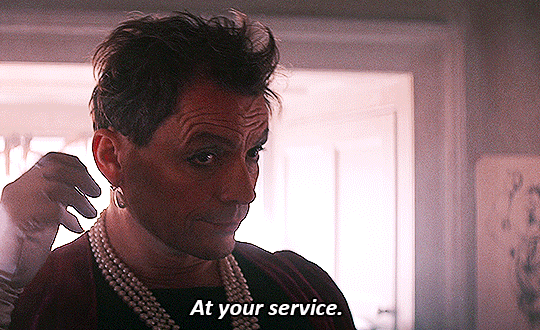
dudley clarke (dominic west)
Not so much a member of the SAS as the guy who helps Stirling bring this plan to fruition. He's great fun, charming and affable, and just as dangerous as anyone else. Dudley Clarke doesn't get enough credit, I think.

mike sadler (tom glynn-carney)
Mike Sadler my OTHER beloved. I joke about Mike coming to fix all the stuff around my flat that doesn't work and it's because he's singlehandedly the most competent member of the entire SAS, I think. His introduction scene is the sexiest thing on the entire show. He only gets introduced in episode 3, but in my heart we have six seasons and a movie with him. He's a member of the Long Range Desert Group and knows more about navigating the landscape than anyone. The LRDG are barely part of the show (save for Mike) and are well worth looking up.
IRL Mike Sadler actually only passed away this year, at the age of 103.

eoin mcgonigal (dónal finn)
Most of what Eoin's around for in SAS: RH is to hang out being impossibly beautiful and being ride or die for Paddy Mayne. Dónal Finn and Jack O'Connell created the most beautiful relationship told in touches. Drives me mad. He's also the first one who really understands who Paddy is beyond the brash and violent front. Eoin McGonigal is certainly a creature.

bill fraser, johnny cooper, reg seekings, jim almonds, dave kershaw, pat riley
(stuart campbell, jacob mccarthy, theo barklem-biggs, corin silva, bobby schofield, jacob ifan)
Look, there are a lot of lads and I can't do them all justice. Some of these folks get a lot more to do than the others, and they're all distinct characters in their own right. There are two matched set duos, Reg & Johnny (enemies to lovers, 150k) and Jim & Pat (do not seperate). Jim & Pat were Jock's crew prior to the SAS and the way he gets them to join is basically by saying "hey, there's a really stupid and dangerous thing i want to do, you in?" and they do this:

each and every one of them is as bad as the others.

augustin jordan, georges bergé, andré zirnheld
Free French paratroopers, who Stirling is reluctantly forced into accepting into the SAS by Eve and Clarke. TBF, this is where SAS: RH really starts playing with history, though it serves the narrative well enough. Show!Augustin Jordan was a former professor of Philosophy at La Sorbonne, and is also a tall dark haired man, so you can see how Paddy Mayne is gonna struggle.
I had to use the sand wrestling gif here (that's augustin), you've probably seen it. It's a surprisingly interesting character scene, would you believe.
There are several other named characters, but I'm running out of energy.
other stuff
OK, so I've lost my thread here a bit. SAS: Rogue Heroes is fun, first and foremost. It really does fall down on the side of "Cool Boys Doing War", so if that's not your thing, maybe you'll not enjoy it. I personally do. And I think it does have some further depth to it than that, even if that's where it comes back to. I've never seen Peaky Blinders, but apparently it's a bit like that? IDK.
While it's very violent, I don't think it's as brutal as the HBO War shows. It's a much more heightened kind of drama, so there's a step removal I think, from the really visceral. That said, it's still a war drama, and it does feature some very nasty business.
soundtrack
it's mostly hard rock and if you don't like this, idk what to tell you. i fucking love it. once again though, mike sadler gets the best of this. you'll know it when you see it.
the fandom
The SAS Rogue Heroes fandom is small but it is mighty and it genuinely is very friendly. There is a Discord if you like, but you don't have to do it if Discord is not your thing.
While the overriding popular ship is Paddy/Eoin, Paddy/Augustin and Reg/Johnny are also wildly popular. That said, we are fond of a rarepair in this fandom, and I personally have embarked on a mission of shipping Mike Sadler with every other character. Everyone's very encouraging of wild ideas and aus, anything's welcome.
A few people are writing OCs, and that too is great. I encourage more of that! I don't think I've seen any x Reader yet, but never say never.
Come join us!
a brief suggested further reading
you really don't have to do any of this, but like, some of you are nerds, i get it. i also got a lot of other recs, but these are some good starters. you can hit me up for more, it's all good.
SAS: Rogue Heroes by Ben Macintyre
SAS Brothers in Arms: Churchill's Desperadoes - Damien Lewis
SAS: An Illustrated History of the SAS - Joshua Levine
Speed, Aggression, Surprise: The Untold Secret Origins of the SAS - Tom Petch
One of the Originals: Story of a Founder Member of the S.A.S. - Anthony Kemp & Johnny Cooper (Johnny Cooper's memoir and imo, if you read nothing else, read this)
The Phantom Major: The Story of David Stirling & the SAS Regiment - Virginia Cowles (this was written in 1958. There is a "rebuttal" biog, The Phoney Major by Gavin Mortimer, which also contains a lot of info, but I find Mortimer's bias against Stirling incredibly difficult to stomach. Difficult.)
Paddy Mayne - Hamish Ross (honestly, I'd not bother with other biogs of Blair Mayne unless you want to do a lot of reading around and getting cross)
Special Forces Brothers in Arms: Eoin & Ambrose McGonigal - Patric McGonigal (this is so personal and so beautiful, I cried several times reading it. written by Eoin's great-nephew. Ambrose, Eoin's older brother was part of the SBS, Special Boat Service, who are ALSO very interesting)
Gentleman Jim: The Wartime Story of a Founder of the SAS and Special Forces - Lorna Almonds-Windmill (another biog by a family member, this one is gentle and told with love)
Joy Street: A Wartime Romance in Letters - the published correspondence between Jock Lewes and Mirren Barford. A slightly different kind of book, but gosh. It really hits.
...and that's all I got for you right now. I could talk about this show for days though.
(forgot to add: my SAS RH blog is @regseekings, I posted this on here for the HBO war fandom)
youtube
#sas rogue heroes#i'm very tired now#i'm gonna go get a sandwich#sasrh reading list#sas: rogue heroes#Youtube
86 notes
·
View notes
Note
hi sam! do you have any recommendations for good sources of info for someone who'd like to learn more about cons and con artists? Any format is fine, books, podcasts, youtube, whatever, i'm just having a hard time finding a good source that really digs into and examines the actual techniques and 'mechanics' so to speak.
It is a little bit tough because of course most scammers are also self-embroidering liars :D And my education was very patchwork. For specifically cons and con artists (outside of art crime, which generally doesn't touch the con world directly) I'd advise starting with "Titanic Thompson: The Man Who Bet On Everything" by Kevin Cook, which is a biography of one of the early 20th century's most preeminent con men; it's a good tale but it also demonstrates the general life trajectory of con men, which can be pretty grim. Most cons end up in prison, and even those that don't or that get out tend to die poor and alone, because they can't stop scamming.
The Mark Inside by Amy Reading is one that I don't remember vividly but I did write a review of here, and I think it's another good starting place. (All the links following are to reviews I did.) If you've ever watched The Sting, which is a movie about con artists and also kind of a good primer, it's based on The Professional Thief by Edwin Sutherland, which is an anthropology of professional crime in the early 20th century. While technically it was written less by him than by an anonymous contact of his in the criminal underworld, that doesn't mean it's accurate per se; we only have that writer's word that any of it is true, so again, read skeptically.
I'd have to look up which piece it was because there's been a lot about her, but if you give Doris Payne a google she's another great example of a fascinating person who is just a giant liar. She paints a very vivid picture of her own career, but if you read about her later years you do realize that she's still conning everyone (she attempts to swindle at least one journalist working with her) and has nothing to show for her career, which may be a pack of lies to begin with. A lot of her stories have been fact checked and found wanting. I'd read up on the life of Victor Lustig as well; he's most famously known as the man who fraudulently sold the Eiffel Tower (twice) but I don't have a good biography offhand.
In your reading you will probably run across Han Van Meegeren, who forged Vermeers and ripped off the art world with them, then was tried for colluding with Nazis because he sold Nazis many "Vermeers" -- he had to paint a Vermeer while in prison to prove he'd forged the ones he sold the Nazis. This is a charming story but until very recently it was not widely noted that Van Meegeren was ABSOLUTELY A BIG NAZI HIMSELF. I was suckered by the story for years and I know most people were, so if you encounter media about him that does not include this fact, and you're interested in his story, look for newer scholarship.
There's a tangentially related book, "Where The Money Was" by Willie Sutton and Edward Linn, that is the semi-autobiography of a bank robber and it's very fun and funny, so despite not being directly about crime, I'd recommend that one.
The Napoleon Of Crime by Ben MacIntyre is a biography of the man who Moriarty was purportedly based on; it's sort of related rather than direct, but I recall enjoying it and there's a fascinating example of the VERY rare times when art heists are for a specific piece rather than for a specific goal.
There's a podcast called Scam Goddess that I found...enjoyable and informative, but also not very well-researched. In particular some of the earlier episodes are really poorly fact-checked. That said, she reads out letters from people writing in to discuss their scams and she talks about a lot of famous scam stories, so as long as you listen with the knowledge that she's neither a researcher nor an expert you should be okay.
Provenance by Laney Salisbury and Aly Sujo is what I'll close with, because it's about the interplay between art crime and con artistry, but it's also a strong argument for not valorizing cons; it's a documentation of how a couple of criminals out for nothing more than a quick buck really fucked up the entire system by which we authenticate art, and did insane levels of damage to genuine art scholarship. This isn't a little guy punching up against millionaire art collectors or fat cat museums, the way the narrative is often framed; art crime like this, involving forged or altered provenances, really harms art historians and the study of art.
I think the study of confidence crime and art crime is absolutely fascinating. There's a lot to learn about social engineering and society itself. But I think if I can impart to you one piece of wisdom, it's that con men are never, ever out for anyone but themselves and have no qualms or hesitations about hurting you to get what they want. The romance of con artistry often fools journalists and sophisticated researchers as well, so it's very easy to get swept up in it, but you should approach the entire genre with the attitude that everything you read has a 75% chance of being a charming work of total fiction.
On that note -- you may enjoy the short stories of O. Henry, some of which are about confidence men; I can't recommend specific titles but his fiction is very enjoyable generally, at least in my opinion.
91 notes
·
View notes